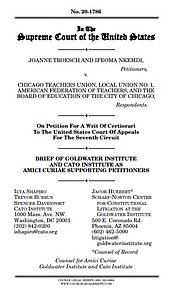Chicago teachers Joanne Troesch and Ifeoma Nkemdi signed an agreement allowing the Chicago Teachers Union, Local 1 (CTU) to collect union dues from their paychecks. The agreement included an escape-period restriction that allows members to stop union dues deductions only during the month of August. When Troesch and Nkemdi signed these forms in September 2017, they did not know they had a constitutional right to not financially support the CTU.
In 2018, the Supreme Court decided Janus v. AFSCME, which held that the First Amendment prohibits public employees from being forced to subsidize union speech. After learning of their First Amendment rights under Janus, Troesch and Nkemdi resigned their union membership. While CTU accepted their resignations, they explained that union dues would continue to be deducted until September 1, 2020, under the August escape-period restriction.
Troesch and Nkemdi sued, arguing that the continued collection of their union dues violates the First Amendment. The district court dismissed their complaint, finding that their constitutional rights were not violated because they consented to the contract, which included the August revocation restriction. In the court’s view, Janus had no effect on the employees’ pre-existing obligations. The Seventh Circuit affirmed the district court’s decision based on its prior precedent. Troesch and Nkemdi have now filed a petition to the Supreme Court, arguing that there needs to be clear and compelling evidence that employees waived their First Amendment rights to seize payments from objecting non-members.
The Cato Institute has joined the Goldwater Institute on a brief supporting the teachers and arguing that a signed union membership agreement, standing alone, is not clear or compelling evidence that employees freely waived their First Amendment right not to pay a union. Since Janus, many states have implemented laws that make it harder for employees to learn their First Amendment rights before they sign union membership agreements. These laws give unions exclusive access to employees while also prohibiting or discouraging employers from advising workers of their First Amendment right not to join or pay a union. We urge the Court to take the case to make clear that an employee’s waiver of their First Amendment rights must be knowing and voluntary. Doing so will allow workers to exercise the rights that Janus is supposed to protect.



